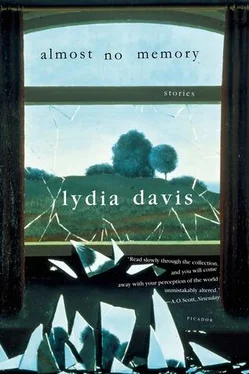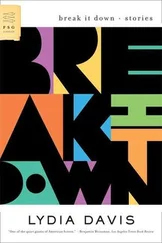Lydia Davis - Almost No Memory
Здесь есть возможность читать онлайн «Lydia Davis - Almost No Memory» весь текст электронной книги совершенно бесплатно (целиком полную версию без сокращений). В некоторых случаях можно слушать аудио, скачать через торрент в формате fb2 и присутствует краткое содержание. Год выпуска: 2001, Издательство: Farrar, Straus and Giroux, Жанр: Современная проза, на английском языке. Описание произведения, (предисловие) а так же отзывы посетителей доступны на портале библиотеки ЛибКат.
- Название:Almost No Memory
- Автор:
- Издательство:Farrar, Straus and Giroux
- Жанр:
- Год:2001
- ISBN:нет данных
- Рейтинг книги:3 / 5. Голосов: 1
-
Избранное:Добавить в избранное
- Отзывы:
-
Ваша оценка:
- 60
- 1
- 2
- 3
- 4
- 5
Almost No Memory: краткое содержание, описание и аннотация
Предлагаем к чтению аннотацию, описание, краткое содержание или предисловие (зависит от того, что написал сам автор книги «Almost No Memory»). Если вы не нашли необходимую информацию о книге — напишите в комментариях, мы постараемся отыскать её.
. In each of these stories, Davis reveals an empathic, sometimes shattering understanding of human relationships.
Almost No Memory — читать онлайн бесплатно полную книгу (весь текст) целиком
Ниже представлен текст книги, разбитый по страницам. Система сохранения места последней прочитанной страницы, позволяет с удобством читать онлайн бесплатно книгу «Almost No Memory», без необходимости каждый раз заново искать на чём Вы остановились. Поставьте закладку, и сможете в любой момент перейти на страницу, на которой закончили чтение.
Интервал:
Закладка:
If I believed that what I felt was not the center of everything, then it wouldn’t be, but just one of many things, off to the side, and I would be able to see and pay attention to other things that were equally important, and in this way I would have some relief.
But it is curious how you can see that an idea is absolutely true and correct and yet not believe it deeply enough to act on it. So I still act as though my feelings were the center of everything, and they still cause me to end up alone by the living-room window late at night. What is different, now, is that I have this idea: I have the idea that soon I will no longer believe my feelings are the center of everything. This is a real comfort to me, because if you despair of going on, but at the same time tell yourself that your despair may not be very important, then either you stop despairing or you still despair but at the same time begin to see how your despair, too, might move off to the side, one of many things.
LOST THINGS
They are lost, but also not lost but somewhere in the world. Most of them are small, though two are larger, one a coat and one a dog. Of the small things, one is a valuable ring, one a valuable button. They are lost from me and where I am, but they are also not gone. They are somewhere else, and they are there to someone else, it may be. But if not there to someone else, the ring is, still, not lost to itself, but there, only not where I am, and the button, too, there, still, only not where I am.
GLENN GOULD
I happened to write to my friend Mitch telling him what my life here was like and what I did all day. I told him that among other things I watched the Mary Tyler Moore Show every afternoon. I knew that he, unlike some people, would understand this. I have just gotten a letter back from him saying that I am not the only person he knows who watches it.
Mitch has a lot of odd pieces of information about people, both famous people and ordinary people. He is always reading books and newspapers, he has a very good memory and a lot of curiosity, and he is always talking to people, both friends and strangers. If he talks to a stranger, he likes to know where that person went to high school. If he talks to a friend, he often asks what that person had for lunch or dinner. He once told me that he tried to remember everything he learned from a conversation with a stranger in order to use it to begin or develop a conversation with another stranger. How suddenly talkative a stranger would become when he found that Mitch already knew a good deal about the politics of Buffalo, New York, for instance. He told me this as we were standing in front of an expensive boutique with a sidewalk display of purses on a busy avenue in the city. We were surrounded by strangers and he had just had a conversation with the man selling the purses.
At this time, which was a few years ago, before he and I both moved out of the city, he used to call me on the phone regularly and talk to me for as long as an hour if I was able to talk that long. I usually told him at some point in the conversation that I couldn’t go on talking because I had to get back to work, and for that he would become annoyed with me. He wasn’t working himself and spent a lot of time in his apartment reading, thinking, playing with his dog, and calling the few friends he stayed in touch with. I never saw his apartment. He told me it was filled with old paperback mysteries. He also borrowed books on a variety of subjects from the public library. He was the only person I knew, at that time, who used the public library. When he asked me what I had had for lunch or dinner, I was always surprised, but also pleased to tell him, probably because no one else was interested in what I had had for lunch or dinner.
In his letter Mitch says that he himself likes the show, and that Glenn Gould also liked it. I am terribly surprised by this. I see two of my worlds coming together that I had thought were as far apart as they could be.
This pianist was a model for me all the time I was a child growing up and learning to play the piano. I listened to certain of his records over and over and studied the jacket photographs of his handsome young face and thin shoulders and chest. Once out of my adolescence, I stopped studying his photographs with such attention but continued to imitate as best I could the clarity of his fingering, his peculiar ornamentation, and his interpretations of Bach in particular. I practiced the piano for as long as four hours at a time, sometimes six, beginning with scales and arpeggios and five-finger exercises, then working on one or two pieces, and then playing through whatever I liked from the books I had. I did not intend to make a career of music, but I could happily have spent my days working as hard at the piano as any professional, partly to avoid doing other things that were harder, but partly for the pleasure of it.
Now that my initial surprise has passed, I am pleased in several ways by the fact that he liked this show. For one thing, I now feel I have a companion watching the show with me, even though Glenn Gould is no longer alive. During his lifetime, he said several times that he would not play the piano after the age of fifty, and ten days after he turned fifty, he died of a stroke. This was a few years ago.
For another, the fact that this companion was so intelligent gives me a new respect for the show. Glenn Gould’s standards were very high, at least concerning the composition and performance of music, and concerning his own writing. He was also articulate and opinionated, and wrote well about music and other subjects. He wrote about Schoenberg, Stokowski, Menuhin, Boulez, and he also wrote about musicians like Petula Clark. He said that when he was a student it had dismayed and puzzled him that any sane adult would include Mozart’s pieces among the great musical treasures of the West, although he enjoyed playing them — he said he had instinctively disapproved of Alberti bases. He wrote about Toronto, television, and the idea of the north. He said that very few people who went into the north emerged unscathed: excited by the creative possibilities of the north, they tended to become philosophers of their own work. Rubenstein loved hotels, but Glenn Gould called himself a “motel man.” He said that twice a year or so he would go along the north shore of Lake Superior where there were lumber and mining towns every fifty miles or so. He would stay in a motel and write for a few days. He said these towns had an extraordinary identity because they had grown up around one industry or one plant. He said that if he could arrange it, that would really be the sort of place in which he would like to spend his life.
Of course, it is also true, as I gradually discovered over the years, that he had many strange notions and habits. Schoenberg was one of his favorite composers, but Strauss was another. He was known to be a hypochondriac and excessively careful of his hands. He dressed warmly no matter what the season, and took his own folding chair with him to concerts, when he still gave concerts, sitting very low in relation to the keyboard. He sometimes practiced with the vacuum cleaner on because that way, he said, he could hear the skeleton of the music. Now Mitch tells me he was fond of a certain rather ugly female pop singer whom he taped, as he also taped this show I like so much. He called the singer’s voice a “natural wonder,” and was amazed by what she could do with it. Mitch does not explain what it was he liked about the television show, and I am still puzzling over this. His sense of humor must have had something to do with it — in his own writings he is quite funny.
Now that we live in a town where so many channels come in clearly, and I’m home alone with the baby so much, I watch the show almost every day. My husband has come to realize that I will always watch it when I can, and sometimes over dinner when we have nothing else to say to each other, he will ask about it. I will tell him something one of the characters said and I can see he is ready to laugh even before I tell it, though so often, in the case of other subjects, he is not terribly interested in what I say to him, especially when he sees that I am becoming enthusiastic.
Читать дальшеИнтервал:
Закладка:
Похожие книги на «Almost No Memory»
Представляем Вашему вниманию похожие книги на «Almost No Memory» списком для выбора. Мы отобрали схожую по названию и смыслу литературу в надежде предоставить читателям больше вариантов отыскать новые, интересные, ещё непрочитанные произведения.
Обсуждение, отзывы о книге «Almost No Memory» и просто собственные мнения читателей. Оставьте ваши комментарии, напишите, что Вы думаете о произведении, его смысле или главных героях. Укажите что конкретно понравилось, а что нет, и почему Вы так считаете.












